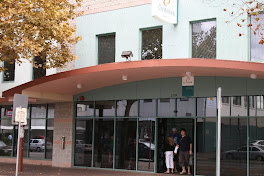International Year of People with Disabilities comes around every year leaving us with feel-good motherhood statements and plenty of spin but not enough substance. Rather than slick advertising campaigns, people with disabilities prefer to be properly consulted and treated as part of the decision-making process affecting our lives. I fear such public relations exercises may conceal a return to paternalistic policies that disempower those of us with disabilities, reinstituting the ‘we know what’s best for you’ rule from above. A lack of true inclusiveness can marginalise those living with disabilities as the other. What people with disabilities need is acceptance and accommodation rather than trivialisation of disabling conditions that make it harder for us to compete in a tight job market.
Let’s start with advertising slogans such as ’don’t diss my ability’ or ‘focus on ability’ which can have positive effects in raising self esteem and social acceptance particularly for children with disabilities. The message is important but without concrete measures to support adults with disabilities entering or re-entering the workforce it becomes meaningless. Because there is no affirmative action legislation to back up the fine sentiments many adults with disabilities find such slogans empty and hypocritical. Alongside slogans we need say 10% of all taxpayer funded part-time jobs reserved for appropriately qualified job applicants with disabilities. This would not only provide genuine assistance and social inclusion, but paradoxically also help to secure merit-based employment in the private sector. In particular, wherever service provision contracts are paid for by the public purse then governments need to ensure private employers don’t discriminate against jobseekers with disabilities by implementing a quota if necessary. In the disability service sector, affirmative-action employment measures should be at least 20% to guarantee qualified jobseekers with disabilities get a fair go.
Employing a significant proportion of disabled workers in the disability service sector would provide encouragement and positive role models for all those living with disabilities who access their services. The wider community would also benefit from coming into contact with a more inclusive workforce. Additionally it would help stem the tide of nepotism which currently deprives this sector of a more diverse, better qualified talent pool in the increasingly privatised disability services. This would help those living with disabilities to reach their full potential and allow us to contribute to society without the shameful social apartheid of sheltered workshops. There are also hidden dangers in treating the privatised disability service sector as a safe haven of cronyism and jobs for the boys. Take the following example.
As an artist living with disabilities who has a Bachelor of Art Education and a Master of Fine Art qualifications, I have been an arts practitioner and educator for over 30 years. Yet when I tried to get part-time work as an art facilitator at a taxpayer funded private company that provides art training services to the disabled I was told they would welcome my unpaid contributions only. When I asked this company’s art facilitator whether his job had been advertised or if there had been any public call for expressions of interest for his position he told me no. He said he was a recent art school graduate and had no formal teaching qualifications. I then explained my qualifications and experience and asked him how I could obtain paid part-time work as a disabled art facilitator at companies like his. He told me that Accessible Arts had a website where I could put down my particulars and any employer who needed my skills could contact me from there. I asked him if that was how he got his job and was told : “ No I was lucky, because my cousin works here.”
I’m not suggesting this is improper because unlike the public service there is no objective examination to guarantee merit-based employment in the private sector even when they are financed by the public purse. There is also less accountability towards clients and jobseekers than in the public sector because they are not subject to Freedom of Information laws and can always claim commercial confidentiality. However it is not just disabled job seekers without connections who are disadvantaged by the privatised disability service sector. When I looked at their website I was horrified to see a photograph showing homeless youth being trained to silkscreen printed Tshirts, without any protective gloves, breathing mask or eyewear. As a four-year trained high school art teacher I knew that this presented a huge occupational health and safety issue but apparently if you are homeless and unemployed, then life is considered very cheap indeed by these private sector job trainers. Just like convicted prisoners the government has legislated to ensure that unemployed people are unable to sue job service providers or Centrelink if they are harmed by their negligence. Will this discriminatory legislation also be extended to people with disabilities?
One suspects that behind all this talk of focusing on ability is a hidden agenda to deny full acceptance and respect for people’s disabilities, brushing aside individual needs and failing to enable supported workforce participation. Why treat people with disabilities as second class citizens by refusing to listen to what we need and even failing to include us in the anti-villification laws that protect other minorities? When it comes to social inclusion initiatives policymakers are still not on the same page. Professor Corinne Mulley, Sydney University’s Chair of Public Transport has proposed not allowing welfare recipients to travel on Sydney’s public transport during peak hours to solve congestion. Considering that most people with disabilities cannot work full-time and must access welfare payments to survive then this divisive proposal if implemented will cause further disadvantage. It is dehumanising and denies us any hope of social acceptance and full workforce participation. Whatever happened to all the hoopla about social inclusion? The silence from relevant government departments and the disability services lobby over this proposal has been deafening. It just shows that the ’Don’t Dis My Ability’ publicity campaign lacks credibility.
If policymakers are serious about focusing on ability then they should recommend quotas for employing disadvantaged jobseekers in all publicly funded positions such as the job service sector, the creative industries and promised new green enterprises. Either that or change the policy settings for the economy away from controlling inflation towards controlling unemployment as was done from the end of the second world war until the mid 1970s. Most economists believe its harder to control inflation if unemployment falls below 4.75% so Reserve Bank and government policies now ensure there is never full employment. But if unemployment is so important for lowering inflation and guaranteeing the health of our economy then why not rotate under/unemployment and give everyone a turn at being employed? The unemployment queue is perhaps the only queue, where the longer you wait your turn for a job, the less chance you have of reaching your destination. Why should the burden of under/unemployment be placed exclusively upon disadvantaged Australians such as the long-term unemployed and people living with disabilities or those with insufficient class connections? Why not advance Australia FAIR?










